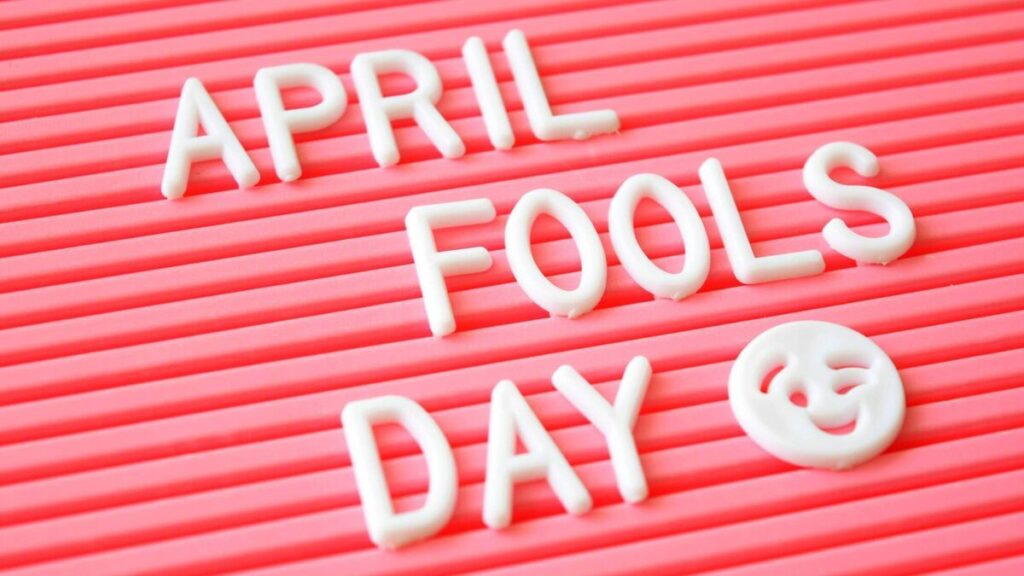EDITORIAL
The Origin of April Fools’ Day – What Netizens Say

In Nigeria, April Fools’ Day is a highly anticipated celebration, with people eagerly awaiting the opportunity to play pranks on friends and family.
“I love April Fools’ Day because it’s a day when people can just relax and have fun,” says Lagos resident, Tolani Adebayo.
“I’ve had my fair share of pranks over the years, but I’ve also had some good laughs.”
For others, April Fools’ Day is a day to be cautious.
“I’m always careful on April Fools’ Day because I don’t want to fall victim to any pranks,” says Abuja resident, Chika Odili.
“But at the same time, I love seeing the creative pranks that people come up with.”
“What may seem like a harmless joke to one person can have negative consequences for another. Consider the feelings of those involved; not everyone may appreciate being the subject of a prank” Justice Okoro from Ebonyi State Cautions Netizens.
April Fools’ Day, a tradition celebrated on April 1st every year, has a rich and mysterious history that spans centuries. The exact origin of this day of pranks and practical jokes is unknown, but historians have pieced together several theories that attempt to explain how this lighthearted holiday came to be.
Experinces and Stories
Amb. Nwede Chinoso, a Political Analyst from Ebonyi State shares his APRIL FOOL DAY experience with ASIWAJU MEDIA.
“April fool is funny experience. At the eave of 1st April, I’m always conscious to avoid friends tricking me. This happened after years of falling victim for the April fool trick.
In my SS 1, the day for April Fool was on Saturday. In morning after my mom left to see someone, a friend rushed in and told me that my mom sent him to inform me that I should head to our nearby farm and weed the grasses. That she forgot telling me when she was leaving. I hurriedly entered the farm after doing house chores to beat sun from scorching me”.
I was in the farm till my mom came back and felt surprised seeing me in the farm weeding. She was happy and shocked too.
I told her that I got the message she sent, hence the reason for the compliance. She was shocked to hear that and told me that she never did so.
Along the line, that my friend who gave me the information came in and started laughing. He echoed: April Foooool.
It was then I realised he tricked me. However, I didn’t back down. I continued the weeding for an hour before retiring home.
There were a lot stories I had about April fool in my Secondary days” Nwede Concluded.
The Calendar Theory: A Shift in Time
One popular theory dates back to 1582, when France switched from the Julian calendar to the Gregorian calendar. Prior to this change, the new year began on April 1st, but with the new calendar, it was moved to January 1st. People who were slow to get the news or refused to accept the change continued to celebrate the new year on April 1st, earning them the nickname “April Fools”.
This theory suggests that the tradition of playing pranks on April 1st originated as a way to mock those who were still celebrating the new year on the wrong date. Over time, the tradition evolved into the lighthearted and playful holiday we know today.
Ancient Roots: Spring Equinox Celebrations
Another theory suggests that April Fools’ Day originated in ancient cultures, where the spring equinox was celebrated on March 20th or 21st. The Romans and Celts, for example, celebrated festivals around this time, which involved playing tricks on each other.
These ancient celebrations were often marked by rituals and customs that involved fooling or tricking others. For example, the Romans would play pranks on each other during their festival of Hilaria, which was celebrated on March 25th [2].
The Modern Era: Newspapers and Media Pranks
The modern concept of April Fools’ Day as we know it today, with its emphasis on practical jokes and hoaxes, likely originated in 16th-century Europe. The tradition was popularized in the 18th and 19th centuries through newspapers and other media outlets, which would publish false stories on April 1st to fool their readers.
One notable example of a media prank is the 1957 BBC broadcast of a segment on Swiss farmers harvesting spaghetti from trees. Many viewers were fooled into believing it was real, and the segment has since become a classic example of an April Fools’ Day prank.
Today’s Celebrations: A Global Phenomenon
Today, April Fools’ Day is celebrated in many countries around the world, with people playing pranks on each other and sharing humorous stories and jokes on social media. The holiday has become a lighthearted and playful way to mark the beginning of spring and to poke fun at ourselves and our friends.
While the exact origin of April Fools’ Day may never be known for certain, its history is a rich and fascinating one that spans centuries and cultures. Whether you’re a fan of pranks and practical jokes or just enjoy the lighthearted spirit of the holiday, April Fools’ Day is a celebration that is sure to bring a smile to your face.
A Word of Caution
As we celebrate April Fools’ Day today, let’s remember to be mindful of others’ feelings and well-being.
Justice Okoro, an Ebonyi man, reminds us:
“Please: Don’t prank sellers who work hard to earn money, Don’t joke about anything that will be harmful to someone.
“Reconsider that prank you want to play on your mom, dad, siblings, friends, etc. Most of them are going through health issues, and I know you wouldn’t want to hurt them, right?”
“Don’t prank delivery men. Fuel is costly . Instead of that irrelevant prank, call them and say ‘Happy New Month’.”
People’s feelings, emotions, and well-being are better than unnecessary pranks.” He added.
Discover more from Asiwaju Media
Subscribe to get the latest posts sent to your email.
-

 NEWS6 days ago
NEWS6 days agoDavid Beckham Hospitalized With Arm Injury As Victoria Shares Update
-

 ENTERTAINMENT5 days ago
ENTERTAINMENT5 days agoFrank Edoho Confirms Split From Second Wife Sandra Onyenuchenuya
-

 NEWS5 days ago
NEWS5 days agoMan Heartbroken As Girlfriend Of 2 Years Denies Him During Interview With YouTuber Asherkine At UNN
-

 ENTERTAINMENT5 days ago
ENTERTAINMENT5 days agoNollywood Mourns As Actor And Producer Kayode Peters Reportedly Passes Away In Canada
-

 JOBS/SCHOLARSHIPS6 days ago
JOBS/SCHOLARSHIPS6 days agoFG Releases YEIDEP 2025 Payment Schedule, Sparks Hope for Youth in Agribusiness
-

 INSIDE NYSC6 days ago
INSIDE NYSC6 days agoNYSC DG Calls For Unity and National Development During Lagos Camp Visit
-

 SPORTS6 days ago
SPORTS6 days agoAbakaliki FC Faces Kwara United Today in Federation Cup Final
-

 POLITICS4 days ago
POLITICS4 days agoChristian Asaga Nwali Bags Award for Contributions to Community Development
-

 ENTERTAINMENT5 days ago
ENTERTAINMENT5 days agoUNN Student Becky Breaks Silence, Denies Claims Of Boyfriend Denial After Viral Outing With Asherkine
-

 NEWS6 days ago
NEWS6 days agoPhilanthropist Christian Asaga Nwali Commissions Bungalow for Elderly Widow in Ikwo
-

 POLITICS5 days ago
POLITICS5 days agoSenator George Akume Resigns as Secretary to the Government of the Federation
-

 SPORTS5 days ago
SPORTS5 days agoAfonja Warriors Spice Up the Final, Leave Rice Boys with an Empty Bowl




























